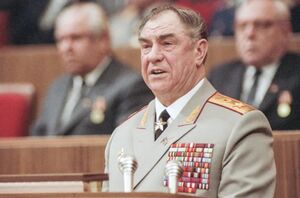Counter-Revolutionary Emergency Commission
This article is incomplete because it is pending further input from participants, or it is a work-in-progress by one author. Please comment on this article's talk page to share your input, comments and questions. Note: To contribute to this article, you may need to seek help from the author(s) of this page. |
Государственная Контрреволюционная Чрезвычайная Комиссия | |
 Dmitry Yazov directing a press conference with other members
of the CEC behind him in 1991 | |
| Abbreviation | CEC |
|---|---|
| Successor | Yanayev Administration |
| Formation | April 2, 1986 |
| Founder | Gennady Yanayev |
| Dissolved | June 14, 1994 |
| Type | Self-proclaimed provisional government |
| Legal status | Disbanded at the end of the Second Russian Civil War |
| Purpose | To prevent the total collapse of the Soviet Union, the prevention of Gorbachev's reforms and the removal of Gorbachev. |
| Headquarters | Kremlin |
Region | Soviet Union |
Membership (1994) | 21,000,000 |
Official language | Russian |
General Secretary | Gennady Yanayev |
The Counter-Revolutionary Emergency Commission (Russian: Контрреволюционная Чрезвычайная Комиссия), abbreviated as KChK or CEC, was a self-proclaimed political body in the Soviet Union that existed from 2 April 1986 to 14 June 1994. It included multiple high-level Soviet officials from the Communist Party, KGB and the Soviet government who successfully won the Second Russian Civil War and carried out the assassination of Mikhail Gorbachev in 1987. The organization was disbanded after the end of the Civil War in 1994 and it's members were incorporated into Yanayev's Administration.
The organization carried out multiple coups across various cities within the Soviet Union to maintain control just before the outbreak of the Civil War, including in Moscow and Leningrad. It eventually extended it's jurisdiction outside of it's occupied cities to become a main contender against the Gorbachev Administration. It is also debated that the actions of the CEC was the breaking point which started the Civil War.
The organization recieved no diplomatic, military or economic support from any other nations, including CSTO members.
Leadership
The CEC was initially led by a collective leadership, known as the "New Central Committee," which became headed by the Commission's founder, Gennady Yanayev. Yanayev served as the acting General Secretary of the CEC for the full duration of the Commission's existance.
As the Civil War became more intense, the leadership became more autocratic in order to consolidate stability and to succesfully manage the faction and it's problems more efficently. By the end of the Civil War, the CEC had two distinct leaders who held joint power within the faction; Dmitry Yazov and Gennady Yanayev.
Key events
Coup d'états
The CEC hosted multiple coup d'états within the Soviet Union in order to undermine Gorbachevs already collapsing authority and to potentially remove Gorbachev from his position and prevent his reforms and the New Union Treaty from being enacted, whilst most of the coups failed, the CEC managed to gain control over various key cities across the RSFSR within June and July of 1987, just months apart from the beginning of the Civil War, these cities included: Moscow, Leningrad, Volgograd and Novosibirsk. This caused the evacuation of the Gorbachev Administration to Minsk which would serve as the de facto capital city of the Soviet Union. The coups proved vital for the CEC in order to establish strongholds for their operations in the upcoming Civil War, they provided the Commission with a large amount of manpower and significant centralized control over it's operations.